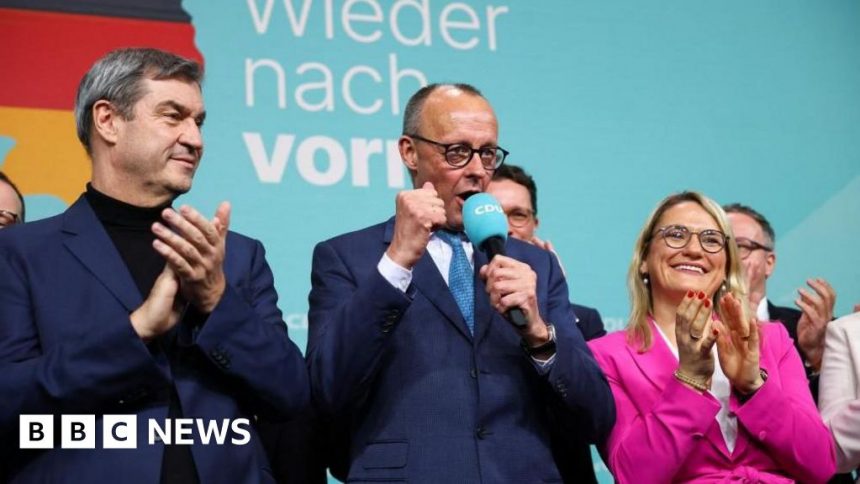Conservatives projected to win German election
 Reuters
ReutersThe conservative CDU/CSU party is projected to be the largest party in the next German federal parliament – or Bundestag – with 28.5% of the vote.
The conservative leader Friedrich Merz, who is now in pole position to become Germany’s next chancellor, hailed a “terrific election campaign” and said there was no time to waste in forming a government.
The far-right Alternative for Germany (AfD) is expected to become the second largest party in the country, with a record 20.6% of the vote.
Millions voted in Germany for a new federal government after the three-party coalition fell apart at the end of last year, prompting a snap election.
CDU/CSU is a centre-right Christian democratic and conservative political alliance of two political parties in Germany – the Christian Democratic Union of Germany and the Christian Social Union in Bavaria.
Merz, who has led the CDU/CSU parliamentary group since 2022, was greeted with cheers when he stepped onto the stage at the CDU headquarters in Berlin following Sunday’s exit poll results.
He was joined by head of the CSU Markus Söder, who thanked the voters for their trust and proclaimed: “We have won the Bundestag election.”
Söder said it had been “a historic election night” for the party and that the CDU and the CSU “prepared very well for this election”.
Merz added that he was “aware of the responsibility that now lies ahead” of him.
While the CDU/CSU is set to be the largest party in the next German parliament, the AfD is expected to come in second.
The party’s co-chairwoman Alice Weidel claimed it a “historic result” for the party as it is up by more than nine points on the 2021 election.
Her co-chair Tino Chrupalla said: “We have received the confidence of the voters and that should be something everybody else accepts as well.”
The exit polls showed Social Democrats (SPD) as coming in third with 16.4% of the vote.
German Chancellor Olaf Scholz, leader of the SPD, said the election results were “bitter” for his party and a “defeat”.
Speaking to supporters in Berlin, Scholz said “we have to acknowledge we have lost the election”.
He congratulated Merz on his projected win.
Exit polls are based on anonymous and voluntary surveys carried out at 560 (out of 80,000) polling stations.
They tend to be relatively accurate but official results are expected early on Monday.








